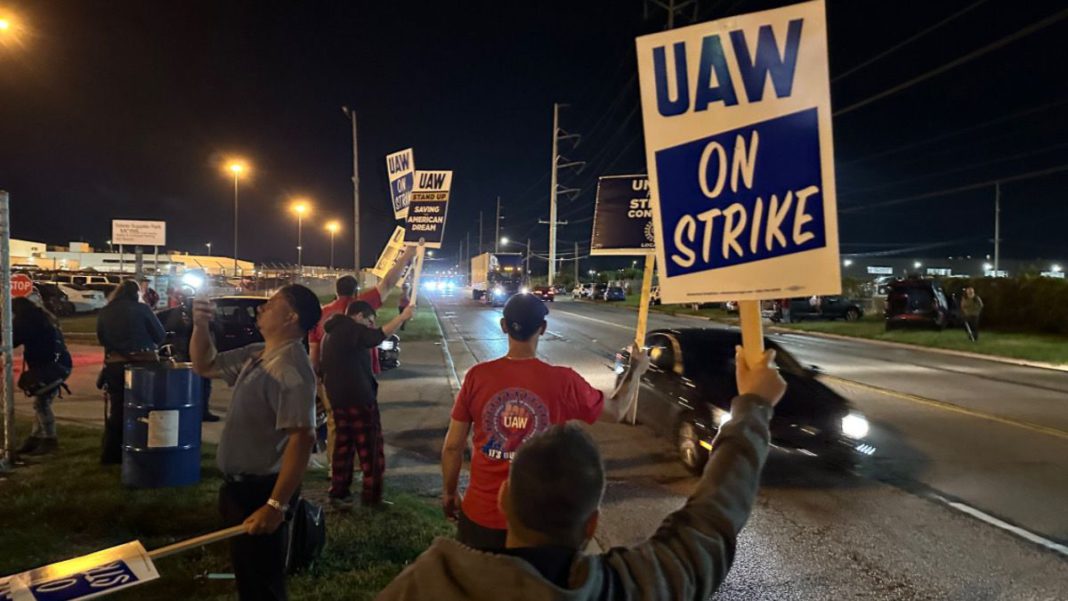UNITED STATES: Employees at three of America’s largest automakers have initiated a strike, the United Autoworkers Union (UAW) says. Operations have ceased at three facilities owned by General Motors, Ford, and Stellantis.
This action follows the expiration of labour contracts on Thursday night. The UAW asserted that the companies had not presented satisfactory proposals. The standoff poses the risk of increased prices for consumers and significant disruptions for these automotive industry giants.
Shawn Fain, UAW’s president, said, “For the first time in our history, we will strike all three of the Big Three.”
The strike commenced at midnight Eastern Time at three key locations: GM’s Wentzville mid-size truck plant, Ford’s Bronco plant in Michigan, and Stellantis’ Toledo Jeep plant. These facilities play a vital role in manufacturing some of the most lucrative vehicles for the “Detroit Three.”
The UAW noted that other plants would remain operational but did not exclude the possibility of expanding the strikes to additional locations beyond the initial three targets.
Ford said that the UAW had submitted its initial significant counterproposal just hours before the current agreement was set to expire. “Unfortunately, the UAW’s counterproposal tonight showed little movement from the union’s initial demands,” it stated.
On Thursday evening, as the deadline approached, the White House disclosed that President Joe Biden had engaged in a telephone conversation with Fain regarding the negotiations without disclosing additional details.
The union had requested a 40% wage increase over four years for its approximately 140,000 members, citing a similar pay raise for company executives.
Additional demands included:
- Implementing a four-day workweek
- Reinstating automatic pay increases tied to inflation
- Tougher limitations on how long workers can be classified as “temporary” staff without receiving union benefits
Negotiations between the two parties, which commenced in July, were fraught from the outset. Fain skipped the traditional handshake with executives that typically marks the beginning of negotiations. Last month, a resounding 97% of members voted to authorise a strike.
As of Wednesday, the three companies had revised their initial proposals, with Ford offering a 20% pay increase over the contract duration, GM proposing 18%, and Stellantis, the parent company of Jeep and Chrysler, offering 17.5%, Fain said.
Workers argued that these companies could afford to be more generous, given their years of record-breaking profits.
Jim Farley, Ford’s CEO, recently stated to the media earlier this week that he hoped to avert a strike but emphasised that there were limits to what the company could concede.
He said, “We have to protect the sustainability of the company.”
A 10-day strike by all employees at the three companies could result in car manufacturers facing nearly $1 billion (£800 million) in losses, while workers might experience nearly $900 million in foregone wages, per the estimate by Anderson Economic Group. It said that when the strike’s impacts spread, the overall economic damage might surpass $5 billion.
Tyler Theile, the firm’s vice president, stated that a strike would need to be “pretty lengthy to move the needle on national economic indicators.”
As the strike unfolds, the supply of cars, which has been under pressure since the parts shortages caused by the pandemic, remains significantly lower than historical levels.
Analysts have suggested that a protracted strike could result in increased prices for consumers.
Ford, GM, and Stellantis collectively represent approximately 40% of US car sales. However, their market share has declined considerably over the past 25 years, with foreign companies like Toyota gaining ground.
The most recent instance of a strike in the automotive industry occurred in 2019 when General Motors employees went on strike for six weeks.
Also Read: Hurricane Lee Moves Closer to US and Canadian East Coast



